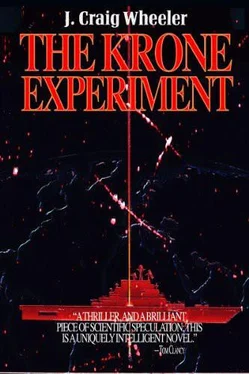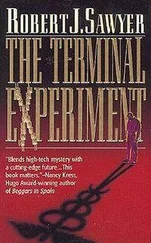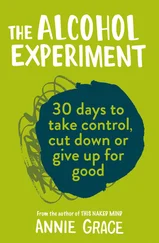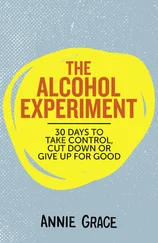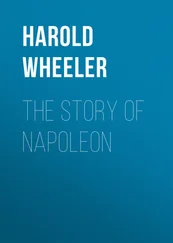Finally Jupp felt control return. He held Wahlquist off at arm’s length.
“Okay, buddy, we’ve got work to do. Let’s bag that bird and get out of here.”
He guided Wahlquist to the copilot’s seat and then settled into the comfortable familiarity of the pilot’s seat. He jockeyed the thrusters and loved every response of his craft. He loved his eye-hand coordination, and he loved the total absence of the terrible repellant artificial gravity that dwelt on the object out his window.
He maneuvered the shuttle until it was beneath the Cosmos once more, craning to see through the window over his head to position the boom. When he was satisfied, he moved to the boom controls at the rear of the flight deck. He released a catch and watched the life-saving mirror drift off to join the other detritus of their mission. Then he raised the boom until it was just beneath the Cosmos. He flipped the switch that set the rotatable stanchion on the end of the boom spinning and with it the payload interface claw. Monitoring the picture from the camera that spun with the claw, he adjusted the speed until the image of the bottom of the Cosmos was fixed, the claw rotating at exactly the same speed. He then closed the gap to the Cosmos and thrust the claw up into the open wound where the bottom antenna had been. He could feel the shuttle rock as the spinning claw sought a purchase on the satellite and transmitted small torques through the stationary boom. He could see the claw span a frame member and he locked it on.
Now for the tedious part. He had to slowly decrease the speed of the claw. Too fast and he could snap the boom or the brace in the Cosmos with equally disastrous results if the spinning satellite should collide with the main span of the boom. As he decelerated the tremendous angular inertia of the Cosmos, it was transferred to the shuttle, setting it spinning. Jupp called orders to Wahlquist who operated the thrusters to remove the spin.
An hour later the Cosmos and the shuttle were one in motion. Jupp slowly lowered the boom until the Cosmos was just out of the bay, the jury rigged wings that had abetted his entry blocking the final nesting. With some reluctance he floated back down through the hatch, passed through the airlock, and stared once again at the hulking satellite. He anchored a tether to his suit, pulled a torch from the rack and affixed it to his belt.
He started on the structure with which he had first collided. His skin crawled to see the gaping hole of the laser port, and its smaller, ragged companion where he had found his first grisly hand-hold. He was too fatigued to do more than a butcher job, but it still required fifteen minutes to sever the blunt structure and shove it off into space. He continued around, doing two more in three-quarters of an hour. He was bone tired. He floated back to the deck of the bay and scanned the remains. He was sure he could position the thing to one side of the bay so that the final wing would fit. God help them if it bounced around during re-entry. He hung up the torch, detached the tether and slipped back through the airlock.
More careful manipulation of the boom brought the Cosmos into the bay, the remaining wing just clearing the hinges where the port clamshell would close. He hit the switch and watched the doors swing shut on their captive with the relief of a beleaguered traveler whose suitcase finally closes. He journeyed once again into the bay and secured the huge bulk as well as possible with various cables and clamps.
For a final time he floated up onto the flight deck and buckled himself into the pilot’s seat. He programmed the computer and they began the descent to near Earth orbit. He suggested to Wahlquist that he discuss with mission control the best mode of re-entry with an evaporated vertical stabilizer, tilted his chair back, and slipped into a heavy sleep.
He awoke fighting the sleep, caught in a fear that if he did not arouse now he never would. He could sense without opening his eyes that the booster was not firing. They were in parking orbit.
“Back in a minute,” he told Wahlquist, as he pried himself out of his chair. Down on the operations deck he stripped off his gloves and undid his helmet. He went to the medicine cabinet and washed down a couple of benzedrine tablets. Wouldn’t do to sleep through re-entry.
Back in the pilot’s seat, he listened intently to Wahlquist. They had immediately concluded that a routine landing at the Cape was out of the question. Emergency crews were assembling on the dry lake expanses of Edwards Air Force Base in the Mohave. Part of the vertical stabilizer was still intact and the guess was that it would provide sufficient stability during re-entry. The problem was that maneuvering in the atmosphere would be severely hampered. They could make some gentle turns with judicious use of wing spoilers, but without the rudder a proper coordinated turn was impossible. Not a job for computers, no programs were written for laser-blasted equipment. Jupp had to fly. He’d known that as he fell asleep, and as he had pawed for the stimulant.
His senses were keen as they did the final burn to start their descent. They began in standard orbital orientation, upside down, rockets pointed in their direction of travel. The rockets thrusted and they dropped into an ever lower, ever faster trajectory. As they entered the atmosphere, they flipped over to the normal atmospheric configuration, nose forward, tiled belly down into the heat. Jupp immediately felt the vibration. Something was wrong with the damaged tail. The mangled remains of the rudder still clung to the lower portion of the vertical stabilizer. The vibration grew to a teeth-clattering shudder. Jupp felt a cool wisp of irony amidst his fear. They would die now together, the shuttle and the Cosmos, after being through so much.
His mind raced, scenes of childhood, his technician’s sense wondering what would give out first, a wing come off, a rupture in the hull? Then in a heartbeat it was gone. The shorn rudder succumbed to its own lack of aerodynamic perfection. The tremendous heat of re-entry ablated and then finally swept it away.
They came out of radio blackout only fifty miles off course. Jupp applied a little spoiler. Not the most perfect turn, his flight instructor would have washed him out had the ball drifted that much in training, but they were back on course. There were the chase planes. God, they were lovely! There was the strip. No graceful turns for position, they were going right down the pipe.
He was going to miss the painted center stripe by a quarter mile, but he couldn’t worry about that. Without the capacity for a coordinated turn he could not risk a destabilizing crab this close to the ground. A bit too hot, too. Can’t be helped. Flaps down. Gear down. Nose up, drop the forward speed as much as possible. Wasn’t this strip supposed to be long? Isn’t that the warning marker? Nose higher, ease her down. Now, nose down, even her up, here we go, flare, flare! Down, bounce, down, down, DOWN!
Jupp heard the ground crew swarm over the craft. He began the post-flight shutdown, responding automatically to prompts from ground control. We’re down, he thought. We made it. We brought the son-of-a-bitch back. I should feel happy. I do feel happy. He looked over at Wahlquist. Below the sightless eyes was a wide, relieved grin.
Then he felt the first grip of nausea.
Rhein Haartvedt hurried along the narrow, dirty street in the fading light, trying to place his carefully polished shoes in the least distasteful spots, his thoughts eddies of conflicting currents. He badly wanted to give this speech, his maiden public stand against apartheid, but conflicting images of past and future crowded his mind. The knowledge tore at him that the way of life that had nourished him, and that his loved ones loved, must be destroyed. He pictured his father: tall, stern, and unyielding, fair in his own way, but blind to the screaming inequities of their system. He imagined his family—father, mother, two sisters—shocked, hounded, uprooted, deprived of their privileged existence, and he felt the pain they would feel at his perceived betrayal.
Читать дальше
